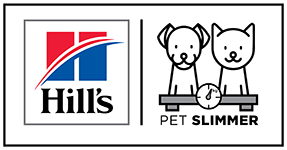

For login details and access to your pets profile and personalized weight loss plan, you will need to first enrol your pet at a Hill’s Pet Slimmer clinic in your area. Click here for more
For login details and access to all your practice’s pet slimmers, you will need to first become a participating Hill’s Pet Slimmer clinic. Click here for more

Pet obesity is the number one health risk
Puppy Fat’ is a problem
You may think your dog has a little ‘puppy fat’ or that your cuddly cat is just the cutest thing, but for pets, even carrying a little extra weight can have huge health implications. It's important to be aware of your pet's weight, as proper growth and weight can help prevent many diseases and disorders associated with obesity, as well as growth-related skeletal disease – extending their lives, making them more comfortable, and delivering massive savings on veterinary bills.
Worldwide, obesity is a massive health problem for humans
According to the World Health Organisation, 39% of adults are overweight. In South Africa some studies indicate that almost 70% of women and 39% of men are overweight or obese. Sadly this trend extends to our pets too - South African vets say that more than 50% of pets they treat are overweight or obese.
Love is blind
9 out of 10 pet parents of overweight pets mistakenly identify their pet’s weight as normal. This is widely referred to as the “Fat Gap” and is a key factor in the pet obesity epidemic. Pet obesity is a serious health risk and sadly 92% of pet parents don’t see it that way. 30% of pet parents don’t check their pet’s weight, but the reality is that they just don’t see that their pets are overweight.
Pet obesity is the number one health risk pets face
Excess weight in pets can decrease their life expectancy by up to two-and-a-half-years, putting them at a higher risk of disease. Pet obesity has been linked to more than 20 ailments, including arthritis, urinary conditions, skin problems, heart disease and cancer. “If you think fat pets are happier, think again – overweight pets have been shown to be less happy,” says Dr Guy Fyvie, nutritional advisor for Hill’s Pet Nutrition South Africa.
Visible signs that your pet may be overweight include not being able to feel their ribs anymore; loss of a discernible waist; pads of fat over their hips and base of their tail; a ‘waddle’ rather than a ‘walk’; difficulty moving; overheating; shortness of breath and bad temper.
Pet parents’ behaviour often plays a major role in their animals being overweight “Treating our loved ones with food is a way we can show them how much we love them. It’s part of our culture and tradition,” says Carla Bath, marketing manager at Hill’s Pet Nutrition South Africa. “But that shared stick of dry wors reflects the emotional part that makes obesity a complex condition that’s tough to beat.”
The right food can help
Sticking to a diet is difficult; much like it is for humans. But cutting your pet’s portion sizes or restricting calories is not going to help. Rather feed your pet a food like Hill’s Prescription Diet Metabolic, based on the science of nutrigenomics, that’s ignites the metabolism of your overweight pet to work like that of a lean pet.
Join the programme and get great rewards!
Pet parents can visit www.PetSlimmer.co.za to find vets who are participating in the Hill’s Pet Slimmer Programme. The programme combines Hill’s clinically proven weight loss food with regular weigh-ins and expert advice, and has proven to be a successful formula for thousands of cats and dogs.
Share this awesome site to spread the awareness of pet obesity